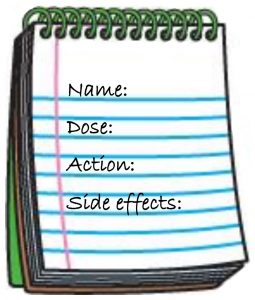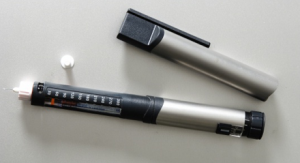4. Medication for diabetes
There are many types of medication to treat diabetes. Your healthcare professional will prescribe the most suitable medication for your diabetes and lifestyle.
It is important to know the following about your medication:
- The name
- How much to take and when to take it
- How your medication works
- Any possible side effects and any affects from other medications you take.
Tablet treatment for diabetes
Your healthcare professional will advise you on when to take your tablets. It is important to remember the following:
- If you miss your medication by more than 1-2 hours, take the next dose at the normal time. NEVER DOUBLE DOSE because you missed a tablet.
- If you are ill, most tablets for diabetes do not need to be stopped during illness. However there are a few tablets which should be stopped temporarily, particularly if at risk of dehydration. Please discuss with GP, diabetes team or pharmacist if you have not been advised.
- If you are vomiting seek medical advice.
By taking your tablets as prescribed you will be able to achieve better blood glucose control and therefore reduce the risk of long term complications. If you are having trouble controlling your blood glucose or have any side effects please discuss this with your healthcare professional.
The list on the next page gives a brief outline of tablets used to treat diabetes, how they work and their main side effects. It is important to read the information leaflets provided with your medication before taking it for more detailed explanations.
| Medication names | How they work | When to take | Main side effects |
|---|---|---|---|
| Sulphonylureas e.g. Gliclazide (Diamicron), Glipizide and Glibenclamide (Daonil) | Stimulate the pancreas to make more insulin | Once or twice a day before meals | Low blood glucose levels (hypoglycaemia) Weight gain |
| Biguanides e.g. Metformin (Glucophage) | Improve your body’s response to insulin and reduces the amount of glucose produced by the liver. This tablet is often the first choice of treatment especially if you are overweight as it does not cause weight gain | Twice or three times per day with meals | Upset stomach and wind, this can be overcome by changing to a slow release form of the tablet |
| Alpha-Glucosidase inhibiters e.g. Acarbose (Glucobay) | Slows the rise in blood glucose normally experienced after meals. It does this by slowing down the uptake of sugars from the intestine | Should always be chewed with the first mouthful of food or swallowed whole with a little liquid immediately before | Upset stomach and wind |
| Glitazones Pioglitazone | These tablets increase the action of your body’s insulin | Once daily | Fluid retention |
| Prandial insulin releasers e.g. Repaglinide (Prandin) and Nateglinide (Starlix) | Help your pancreas to produce more insulin after meals to cope with the increase in blood glucose following eating carbohydrate | Directly before meals | Upset stomach, wind and low blood glucose (hypoglycaemia) |
| DPP-4 inhibitors e.g. Sitagliptin (Januvia),Saxagliptin Vildagliptin (Galvus), Linagliptin (Trajenta) | Increase gut hormones (incretins) that help the body respond to raised blood glucose levels | Usually once daily | Nausea |
| SGLT2 inhibitors e.g. Dapagliflozin (Forixga) Canagliflozin (Invokana) | Help to reduce the blood glucose level by increasing the glucose passed out in the urine and stopping the reabsorption of glucose in the kidney | Once daily | Urinary tract infections, thrush |
Incretin Mimetics
e.g. Liraglutide (Victoza), Lixisenatide (Lyxumia) – daily injection
Exenatide (Bydureon), Dulaglutide (Trulicity) – weekly injection
Aid the body to increase production of insulin after a starchy meal,reduce the amount of glucose produced by the liver, slow the emptying of the stomach and can make you feel satisfied with smaller portions of food. It is given by injection. The main side effect is nausea.
Insulin treatment
The treatment for Type 1 diabetes is insulin, along with a healthy diet and lifestyle. Insulin has to be given by injection. Insulin cannot be taken in tablet form as the acids produced in the stomach would destroy it. If you have Type 2 diabetes and need to start insulin treatment because your blood glucose is not controlled on diet and tablets, some of the tablets you take may be continued.
The idea of starting insulin may be scary but your healthcare professionals are there to help you make this change. Any concerns should be discussed with your GP or diabetes specialist nurse who will give you the information you need to put you more at ease before you start insulin. The type of insulin and the number of injections will be based on your blood glucose results, lifestyle and wishes. All the options will be discussed, to help you make the right choice for you. Your healthcare professional should discuss the following:
- How to inject your insulin

- How to recognise and treat a low blood glucose (hypoglycaemia)
- What to do if you become ill (sick day rules)
- DVLA guidelines for driving
- On-going review
